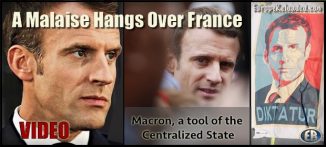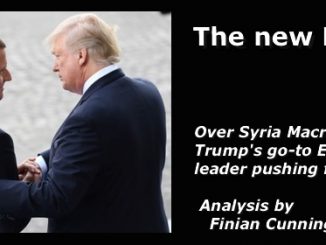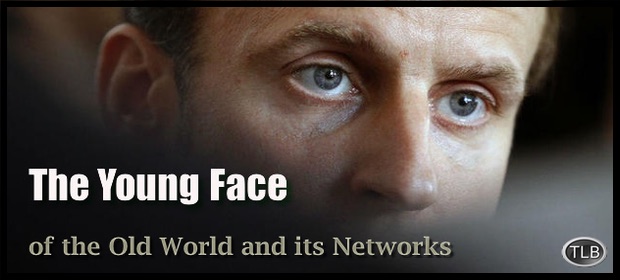
ER Editor: We also recommend an article by Thierry Meyssan we published in January titled Who does Emmanuel Macron owe for all this? illustrating Macron’s origins within the NATO crowd, and another article by Meyssan titled From the Saint-Simon Foundation to Emmanuel Macron.
********
The globalist impostor Emmanuel Macron
Who is the French President, where does he come from and what does he want to achieve? FWM takes a deep look into his twisted biography.
Who is the real Emmanuel Macron, the man who, at the age of fifteen, was seduced by his 24-year-old, married teacher Brigitte Auzières at the Jesuit school “La Providence” in Amiens in northern France,  the mother of his classmate Laurence? His former classmates describe him as an eloquent loner who was always interested in older people – an assessment shared by his later Socialist party colleague Julien Dray, who once referred to Macron as a “Casanova”.
the mother of his classmate Laurence? His former classmates describe him as an eloquent loner who was always interested in older people – an assessment shared by his later Socialist party colleague Julien Dray, who once referred to Macron as a “Casanova”.
Macron graduated from the elite school Lycée Henri IV in Paris in 1995, where his parents had banished him in the vain hope of putting an end to the affair with his teacher. Emmanuel Macron was not one of the best students in his class, but he understood, according to former classmates, “how to dazzle by the use of clever-sounding words”.
As of 2012, Macron either repeatedly told reporters that he was a graduate of the elite institution, the Ecole Nationale Supérieure (ENS Ulm), or rejected reports claiming this. But in reality, his presence at the ENS in 1996 and 1997 was limited to taking part in the very difficult selection procedure – which he failed twice.
Between 1998 and 2001, Macron actually studied at the less prestigious, but deconstructivist and fasionable Parisian elite school Science Po. At the same time, he began to study philosophy at the University of Paris-Nanterre, where he assisted the philosopher Paul Ricoeur as an assistant in compiling the bibliography for the book La Mémoire, l’histoire, l’oubli.
Macron and the mainstream media later embellished his simple assistant job by transforming Macron into the deputy editor of the book by the philosopher, who had passed away in 2005. Macron claims to have written his master’s thesis on the philosopher Etienne Balibar, but he told the media that he had “neither a recollection nor documents about this episode”.
His desire to be perceived as a great intellectual drove Macron to interchange views on questions of Islam and the separation of state and religion with university professors Gilles Kepel and Abdelwahab Meddeb in the summer of 2016. The only problem here was that the Tunisian Meddeb had died in 2014.
From 2002 to 2004 Macron studied at the ENA (ER: the university for France’s future presidents and top administrators) in Strasbourg and then began to work for the Inspection générale des Finances. He was promoted by the Chief Executive Officer, Jean-Pierre Jouyet, later Secretary of State for European Affairs under Nicolas Sarkozy and Secretary General of François Hollande.
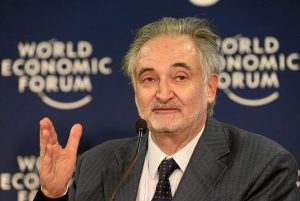 In his office Macron met Jacques Attali (pictured) in 2007, the éminence grise of the French globalists. Shortly thereafter, Macron was appointed as Deputy Rapporteur to the commission, which included politicians, entrepreneurs, trade unionists, French and Europeans united in their belief in progress through liberalism, which had been commissioned by Sarkozy.
In his office Macron met Jacques Attali (pictured) in 2007, the éminence grise of the French globalists. Shortly thereafter, Macron was appointed as Deputy Rapporteur to the commission, which included politicians, entrepreneurs, trade unionists, French and Europeans united in their belief in progress through liberalism, which had been commissioned by Sarkozy.
For Macron, working there was the parachute into the world of the powerful and the wealthy. The man, who in the words of his first patron Jean-Pierre Jouyet “seduces, uses and then throws away”, met Nestlé’s CEO Peter Brabeck there and then in 2008, on the recommendation of Attali, the founder and owner of the Weinberg Investment Fund, Serge Weinberg, as well as the former CEO of Essilor, Xavier Fontanet, was recruited as  an investment banker by Rothschild Bank’s François Henrot (pictured).
an investment banker by Rothschild Bank’s François Henrot (pictured).
Alain Minc, an ENA graduate and political adviser, boasting a strong relationship with major French companies, had previously advised Macron to seek his own economic independence in order to advance his career in politics.
According to the mainstream media, Macron quickly earned the reputation of “a Mozart of finance” at Rothschild, but under the protection of anonymity, a Parisian banker recently stated: “He had a reputation for never having done anything”.
An anonymous industry expert also told the news website franceinfo.fr, “an investment banker is a breeding horse, a rare pearl. You firstly buy an address book with him, especially in France. To be an Investment Banker, you must have completed the ENA and the Inspection of Finances, because these people only pick up their phone for an alter ego”.
French business daily Les Echos wrote that Emmanuel Macron did not have the classic profile of a banker and he was not a Rothschild product. Neither did Macron make money for the bank, as a farce from the year 2010 shows: Macron officially advised the editorial board of Le Monde, which was looking for a way of refinancing, but was also secretly in contact with Alain Minc, who supported the offer by Perdiel-Prisa-Orange to buy the newspaper, which the editorial community considered as particularly hostile.
“First he inspired us – for himself, then he betrayed us”, the vice-president of the editorial community Adrien de Tricornot later remarked. “I think that Macron gained some notoriety in Paris by presenting himself as a representative of the majority shareholders, which gave him the opportunity to discuss with many people. And then he saw his rivals such as investment banker Mathieu Pigasse of Lazard Bank enter into negotiations. I think Macron was on his own”
After this farce, Macron was promoted in late 2010 as a shareholder of Rothschild Bank. Did this have to do again with his contacts? Since 2010 he trained with the expert working group “La Rotonde” from the Rothschild hub which had designed the economic programme of the Socialist candidate Francois Hollande.
Macron had only made one real lucrative deal while at Rothschild, and this was served to him on a silver platter: Nestlé’s nine-billion-euro buyback of the baby milk business from Pfizer, for which Nestlé CEO Peter Brabeck, whom he had met at the Attali Commission, hired him.
Macron earned 2.4 million euros, but on his tax return of 2016, his official assets had shrunk to 60 000 euros. Macron was a member of the Socialist Party only in the period from 2006 to 2009. In 2007, his dream of becoming a Socialist candidate for the House of Representatives failed when the Socialist voter base of his Picardy home region rejected him.
 After this humbling experience, he refused all other candidacies in local elections over the next few years. In 2015, he commented on his choice not to compete in the parliamentary elections: “Getting ahead through elections is a throwback to old times.” But thanks to Francois Hollande’s victory in the presidential election, Macron’s political career was actually launched despite a lack of backing at the grassroots level. He became Hollande’s Deputy Secretary General and presented himself to the media as “rightwing” and “liberal”. In 2014 he was invited for the first time to the annual Bilderberg meeting.
After this humbling experience, he refused all other candidacies in local elections over the next few years. In 2015, he commented on his choice not to compete in the parliamentary elections: “Getting ahead through elections is a throwback to old times.” But thanks to Francois Hollande’s victory in the presidential election, Macron’s political career was actually launched despite a lack of backing at the grassroots level. He became Hollande’s Deputy Secretary General and presented himself to the media as “rightwing” and “liberal”. In 2014 he was invited for the first time to the annual Bilderberg meeting.
In July 2014, Macron left his post as Secretary General, after he had been overlooked for a ministerial post in the government of Manuel Valls. Earlier that summer, he had obtained a lectureship from the Humboldt University in Berlin and, thanks to his relationship with Alain Minc, also received the title of Senior Research Fellow in Political Economy from the London School of Economics, where he gave lectures on the European policy mix.
He also tried, with the help of French economist Philippe Aghion, to get a teaching post at Harvard University, and with the Internet mogul Xavier Niel, he visited start-ups in California. But before Macron, as had been announced, could start up his own business, the Office of the Minister of Economic Affairs from the big wide world called him back to the smaller pond of Paris.
As soon as Macron became Minister of Economic Affairs, he announced an initiative for economic growth and increased purchasing power. The laws on Sunday work, on regulated professions, on transport and driving licenses were earmarked for liberalization, and the transport market was opened up to competition from buses.
But because the adoption of this law by parliament was considered risky, it was adopted as an emergency decree. In reality, the law turned out to be completely ineffective in stimulating the economy. Only a few  benefited from the measures, such as ex-Rothschild banker Yvan Lefranc-Morin (pictured), who, just before Macron opened the transport market for intercity buses, had switched to the German low-cost bus company Flixbus.
benefited from the measures, such as ex-Rothschild banker Yvan Lefranc-Morin (pictured), who, just before Macron opened the transport market for intercity buses, had switched to the German low-cost bus company Flixbus.
While liberalization came as a surprise to most Flixbus competitors, the German start-up “coincidentally” immediately secured a share of more than 50 percent of the French market, which is considered one of the most important in Europe. Lefranc-Morin was soon promoted to the position of Flixbus Director General France.
The gradual extension of shop hours on Sundays was not a “stimulus to growth”, but meant that half of the “Toothless” – a term that Socialist Hollande invented for the poor and low-paid French citizen – worked on Sundays in supermarkets and hardware stores, while the other half of the penniless “Toothless” admired the displays on the shelves.
The opening up of the transport market to “shared economy” companies, on the other hand, led to financial ruin for most taxi drivers. Their taxi licenses, which had the value of a single-family home at the time of purchase, became worthless overnight. Thus, Macron deliberately created a new underclass, the class of men he despises.
His insult directed at two workers in Lunel, southern France, who had voiced their concerns over the 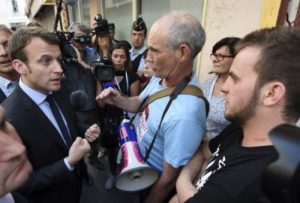 changes in labor law still reverberates around France: “You do not scare me in your T-shirts. The best way to afford a suit is to work!” was the response of the Minister of Economic Affairs Macron.
changes in labor law still reverberates around France: “You do not scare me in your T-shirts. The best way to afford a suit is to work!” was the response of the Minister of Economic Affairs Macron.
Under Macron’s supervision, Toulouse airport was also sold to a Chinese offshore company from the British Virgin Islands in a completely non-transparent transaction, contrary to the minister’s public promises that the state, together with the local administrative units, would remain majority shareholders.
Chief investor Mike Poon then disappeared for a while after being investigated during a graft probe into one of his other offshore companies in the Cayman Islands. When Poon reappeared a few months later, he plundered the airport’s financial reserves and distributed them as dividends to its shareholders.
Macron used his time as Minister of the Economy mainly to organize his own presidential campaign. In the eight months of 2016, he misused 120,000 euros, or about 80 percent of the representation budget of the Ministry of Economic Affairs, and used the money to organize donations galas for his election campaign.
Only 450 people gave 6.3 million euros and thus financed half of his campaign budget. Some 56 percent of these donors live in the Greater Paris area, while the others are scattered around other important financial centers of the world. At least 95,000 euros came from Switzerland, more than the 78,364 euros from Marseille, France, while 18 donors from Lebanon gave 105,000 euros, more money than Bordeaux and Lille together.
And in London, 800,000 euros were collected, more than the ten largest provincial French cities together. The companies that ran the election campaigns also offered large discounts.
Macron, the young face of the old world and its networks, was voted in as the eighth president of the Fifth Republic on 7 May, 2017 with the financial help of the globalist networks and its media. The consequences are known.
Rudolf Erdmann
************
Original article



